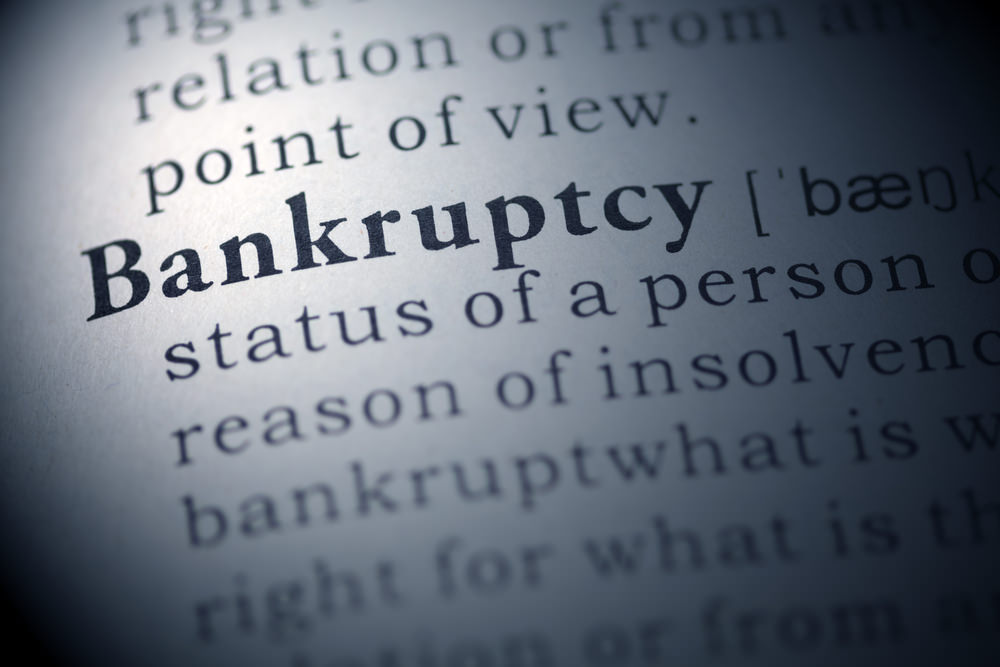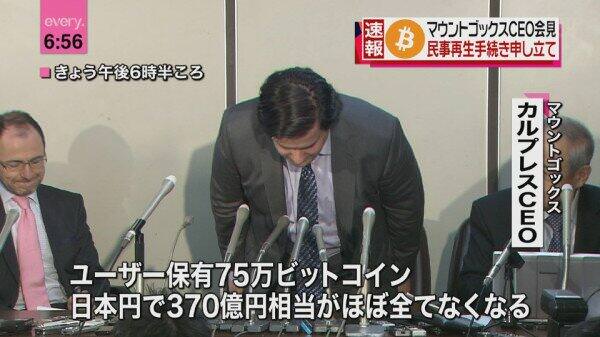
Mt. Gox Files for Bankruptcy, Claims $63.6 Million Debt
Mt. Gox is officially filing for bankruptcy protection with an outstanding debt of ¥6.5bn ($63.6m), finally admitting openly that 750,000 of its customers' bitcoins and 100,000 of the company's own have been lost.
The exchange's lawyer announced the news during a conference at the Tokyo District Court late on Friday afternoon, Japan time. CEO Mark Karpeles, wearing a suit and tie, bowed deeply in the tradition of disgraced Japanese business leaders fronting the media.

Subtitles read: "The 750,000 bitcoins we kept for users, (37,000 million yen), almost all gone."
That same document also described fiat assets of $32.43m and liabilities of $55m. The assets include $5m "held by CoinLab" and another $5.5m “held by the DHS”. The Department of Homeland Security seized that amount from Mt. Gox's US accounts in mid 2013, claiming it had not registered properly as a money transmission business.
Nightmare week
It's been a nightmare week for Mt. Gox and its customers, with much of the situation's true nature still mired in online speculation, rumor and conspiracy theories. The exact fate of all Mt. Gox customers' bitcoins is still unclear: how such an amount came to be lost or stolen without anyone knowing or taking action, whether 'transaction malleability' was indeed behind it, or whether they were transferred to other addresses or lost to the bitcoin network altogether.
CEO Karpeles resigned his position on the Bitcoin Foundation Board just four days ago, beginning a chain of events that culminated in today's press event. Shortly after that, Mt. Gox's entire Twitter history disappeared, the 'crisis' documents were leaked, and then the website went completely offline, taking with it most customer hopes of ever seeing their money again.
The domain mtgox.com now features only a blank page with the Mt. Gox logo and two short statements, one of which reads "In light of recent news reports and the potential repercussions on MtGox's operations and the market, a decision was taken to close all transactions for the time being in order to protect the site and our users. We will be closely monitoring the situation and will react accordingly."
The most recent, from 26th February, reassures everyone that Karpeles is still in Japan and "working very hard with the support of different parties to find a solution to our recent issues."
While no regulatory action is guaranteed in Japan, federal prosecutors in New York City have subpoenaed Mt. Gox and requested that it preserve documents that may be relevant.
Protest ends, customers lament
Kolin Burges, who triggered media interest around the world with his protest outside Mt. Gox's office and confrontation with Karpeles nearly two weeks ago, took the opportunity to pack up his signs and head back to London.
Packed up #mtgoxprotest for the last time and did leaving interview with Asahi TV. It's been a wild ride! pic.twitter.com/01CiuHG7OT— Kolin Burges (@the_K_meister) February 28, 2014
Most customers have now resigned themselves to losing hundreds of thousands or even millions of dollars, including those who claim to have lost business startup capital, college funds or even entire life savings in the crash. Burges himself claimed to have lost around $300,000 in bitcoins.
Bankruptcy image via shutterstock
DISCLOSURE
The leader in news and information on cryptocurrency, digital assets and the future of money, CoinDesk is a media outlet that strives for the highest journalistic standards and abides by a strict set of editorial policies. CoinDesk is an independent operating subsidiary of Digital Currency Group, which invests in cryptocurrencies and blockchain startups. As part of their compensation, certain CoinDesk employees, including editorial employees, may receive exposure to DCG equity in the form of stock appreciation rights, which vest over a multi-year period. CoinDesk journalists are not allowed to purchase stock outright in DCG.

